pwn.college - Binary Reverse Engineering - level14_testing1
[Part 0] Setup Challenge
- The original ELF binary can be found here: download
- A copy of the ELF binary has also been included here: download
Basic Info on Challenge Binary
rabin2 -I /level14_testing1
arch x86
baddr 0x0
binsz 16527
bintype elf
bits 64
canary true
class ELF64
compiler GCC: (Ubuntu 9.3.0-10ubuntu2) 9.3.0
crypto false
endian little
havecode true
intrp /lib64/ld-linux-x86-64.so.2
laddr 0x0
lang c
linenum true
lsyms true
machine AMD x86-64 architecture
maxopsz 16
minopsz 1
nx true
os linux
pcalign 0
pic true
relocs true
relro full
rpath NONE
sanitiz false
static false
stripped false
subsys linux
va true
- pic is true, i.e. PIE is enabled
- ELF binary is not stripped
Running Binary
$
/level14_testing1
[+] Welcome to /level14_testing1!
[+] This challenge is an custom emulator. It emulates a completely custom
[+] architecture that we call "Yan85"! You'll have to understand the
[+] emulator to understand the architecture, and you'll have to understand
[+] the architecture to understand the code being emulated, and you will
[+] have to understand that code to get the flag. Good luck!
[+] Starting interpreter loop! Good luck!
ENTER KEY: AAAAAAAA
INCORRECT!
- The program is a custom emulator of an unknown architecture called Yan85
- This write-up uses a combination of static and dynamic analysis to determine what instructions emulator supports, if it emulates registers, memory, syscalls, etc, then eventually gets the flag
[Part 1] Static Analysis Using radare2
- Open ELF binary in radare2:
$
r2 -A /level14_testing1
- The ELF binary is not too large, so
-Aanalysis does not take long - Note: as PIE is enabled, all memory addresses in radare2 should be interpreted relatively (i.e. not absolute references)
- List all functions (focus on the interesting ones, e.g. ignore imports
sym.imp.*):
[0x00001180]>
afl
[...]
0x0000129b 15 194 sym.read_register
0x00001269 1 50 sym.crash
[...]
0x00001a7b 17 257 sym.interpret_instruction
[...]
0x000017f5 13 646 sym.interpret_sys
0x000015e6 1 93 sym.interpret_stm
0x00001461 1 48 sym.write_memory
0x00001491 1 51 sym.interpret_imm
0x0000135d 15 223 sym.write_register
0x00001527 5 191 sym.interpret_stk
[...]
0x00001643 1 85 sym.interpret_ldm
0x0000143c 1 37 sym.read_memory
0x00001bff 3 274 main
[...]
0x00001b7c 2 131 sym.interpreter_loop
[...]
0x00001698 12 260 sym.interpret_cmp
0x0000179c 4 89 sym.interpret_jmp
0x000014c4 1 99 sym.interpret_add
[...]
View main() Function
- Visual Graph mode of
mainfunction (navigate usinghjklkeys, press colon:to access command line):
[0x00001180]>
VV @ main(similar toagfv @ main)
Presspkey once to display additional line info
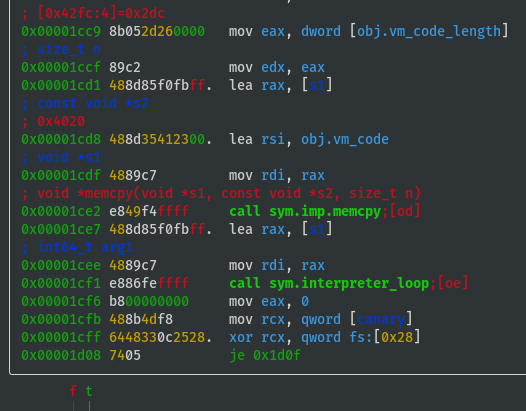
Emulator's Bytecode
obj.vm_codeshould be the emulator's own bytecode and this is being memcpy'd on to the stack- View hex dump of
obj.vm_code:
V @ obj.vm_code
[0x00004020 [Xadvc]0 62% 896 /level14_testing1]> xc @ obj.vm_code
- offset - 0 1 2 3 4 5 6 7 8 9 A B C D E F 0123456789ABCDEF comment
0x00004020 0101 4701 1089 4010 0101 012e 0110 8f40 ..G...@........@ ; obj.vm_code
0x00004030 1001 0101 4c01 1082 4010 0101 01ab 0110 ....L...@.......
0x00004040 8540 1001 0101 8601 1083 4010 0101 0157 .@........@....W
0x00004050 0110 8a40 1001 0101 3401 1086 4010 0101 ...@....4...@...
0x00004060 0127 0110 8740 1001 0101 3b01 108d 4010 .'...@....;...@.
0x00004070 0101 01c2 0110 8c40 1001 0400 2004 0008 .......@.... ...
0x00004080 0400 1001 0801 0208 0201 0145 0400 0101 ...........E....
0x00004090 014e 0400 0101 0154 0400 0101 0145 0400 .N.....T.....E..
0x000040a0 0101 0152 0400 0101 0120 0400 0101 014b ...R..... .....K
0x000040b0 0400 0101 0145 0400 0101 0159 0400 0101 .....E.....Y....
0x000040c0 013a 0400 0101 0120 0400 0101 100b 0120 .:..... .......
0x000040d0 0108 0401 0410 0004 0800 0420 0004 0020 ........... ...
0x000040e0 0400 0804 0010 0108 4001 100e 0120 0008 ........@.... ..
0x000040f0 0801 0410 0004 0800 0420 0001 0197 0110 ......... ......
0x00004100 8840 1001 0101 a801 108b 4010 0101 0190 .@........@.....
0x00004110 0110 8e40 1001 0101 d201 1084 4010 0101 ...@........@...
0x00004120 0489 0220 1002 0810 0101 ff02 2001 0208 ... ........ ...
0x00004130 0104 0020 0400 0880 2020 8008 0820 2008 ... .... ... . ; str._b_b___b
0x00004140 0408 0004 2000 0101 6a10 0401 0101 ff02 .... ...j.......
0x00004150 1001 0101 0020 1001 0101 5810 0401 0401 ..... ....X.....
0x00004160 1004 0400 0108 0102 0802 0101 4904 0001 ............I...
0x00004170 0101 4e04 0001 0101 4304 0001 0101 4f04 ..N.....C.....O.
0x00004180 0001 0101 5204 0001 0101 5204 0001 0101 ....R.....R.....
0x00004190 4504 0001 0101 4304 0001 0101 5404 0001 E.....C.....T...
0x000041a0 0101 2104 0001 0101 0a04 0001 0110 0b01 ..!.............
0x000041b0 2001 0804 0101 2001 0802 0001 2040 0108 ..... ..... @..
0x000041c0 8401 100c 0101 0202 0104 0400 0101 0456 ...............V
0x000041d0 0110 0020 0110 0101 9610 0201 0101 6c10 ... ..........l.
0x000041e0 1101 0108 0102 0802 0101 4304 0001 0101 ..........C.....
0x000041f0 4f04 0001 0101 5204 0001 0101 5204 0001 O.....R.....R...
0x00004200 0101 4504 0001 0101 4304 0001 0101 5404 ..E.....C.....T.
0x00004210 0001 0101 2104 0001 0101 2004 0001 0101 ....!..... .....
0x00004220 4804 0001 0101 6504 0001 0101 7204 0001 H.....e.....r...
0x00004230 0101 6504 0001 0101 2004 0001 0101 6904 ..e..... .....i.
0x00004240 0001 0101 7304 0001 0101 2004 0001 0101 ....s..... .....
0x00004250 7904 0001 0101 6f04 0001 0101 7504 0001 y.....o.....u...
0x00004260 0101 7204 0001 0101 2004 0001 0101 6604 ..r..... .....f.
0x00004270 0001 0101 6c04 0001 0101 6104 0001 0101 ....l.....a.....
0x00004280 6704 0001 0101 3a04 0001 0101 0a04 0001 g.....:.........
0x00004290 0110 1c01 2001 0804 0101 012f 0110 8040 .... ....../...@
0x000042a0 1001 0101 6601 1081 4010 0101 016c 0110 ....f...@....l..
0x000042b0 8240 1001 0101 6101 1083 4010 0101 0167 .@....a...@....g
0x000042c0 0110 8440 1001 0101 0001 1085 4010 0101 ...@........@...
0x000042d0 2080 0108 0008 2001 0108 8001 10ff 0120 ..... ........
0x000042e0 0002 2001 0808 0101 0880 0110 0002 1001 .. .............
0x000042f0 0120 0108 0401 0120 0008 0200 dc02 0000 . ..... ........ ; obj.vm_code_length
- Assuming value @ 0x000042fc is
obj.vm_code_length, which is0x02dcin little endian, test assumption:
:>
? 0x42fc-0x4020
uint32 732
hex 0x2dc
- Above vm_code_length assumption seems correct, therefore vm_code is from 0x00004020 to 0x000042fb, inclusive (also recall that PIE is enabled, so these addresses will be different when executing the program, but the relative addresses are still important)
- Some interesting strings are included in the bytecode:
- From 0x00004089 to 0x000040bb "..E.....N.....T.....E.....R..... .....K.....E.....Y.....:"
- From 0x0000416a to 0x000041a2 "..I.....N.....C.....O.....R.....R.....E.....C.....T.....!"
- From 0x000041e8 to 0x00004286 "..C.....O.....R.....R.....E.....C.....T.....!..... .....H.....e.....r.....e..... .....i.....s..... .....y.....o.....u.....r..... .....f.....l.....a.....g.....:"
- Note that the spacing is always the same between the ASCII characters
- Just before the call sym.interpreter_loop, rdi = stack address of the memcpy'd vm_code, rsi = original address of
obj.vm_code
View interpreter_loop() Function
- View
sym.interpreter_loopfunction to understand if/how either variables are utilised:
[0x00001180]>
VV @ sym.interpreter_loop
- Looks like rdi (stack address of the memcpy'd vm_code) is used, but rsi isn't:
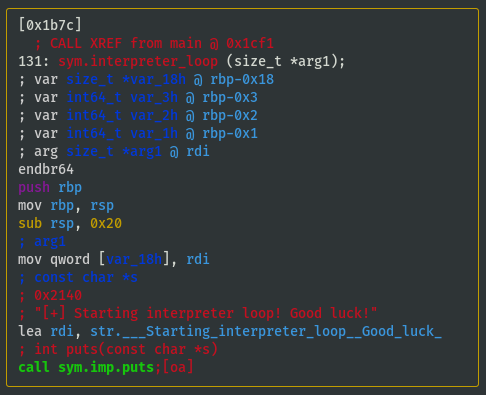
- Last block of code is a loop:
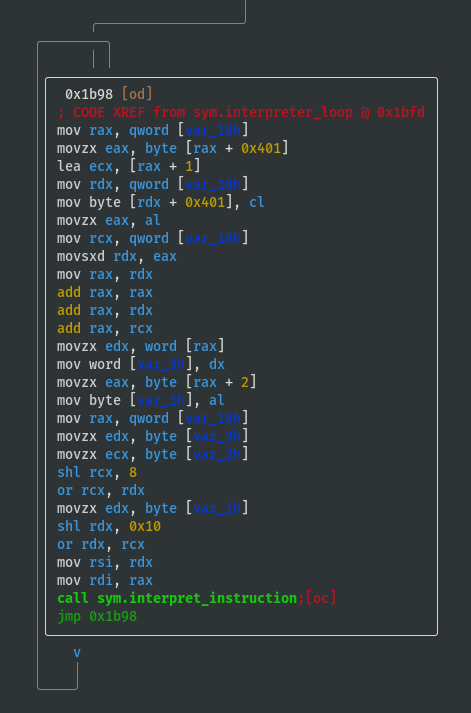
- Above loop iterates over 3 bytes at a time
- Each byte is selected individually by doing some
shls (bitwise left shift) andors then they are moved to the stack and back into registers before callingsym.interpret_instruction, either to sort or jumble the order (TBD: understand how the order is interpreted) - Each instruction is therefore size 3 bytes
View interpret_instruction() Function
- View
sym.interpret_instructionto understand what instructions are supported by the emulator (focus on the branching, i.e. whattest/cmpconditions are required to either jump or not jump?):
[0x00001180]>
VV @ sym.interpret_instruction
- If opcode==0x01 then call
sym.interpret_imm:
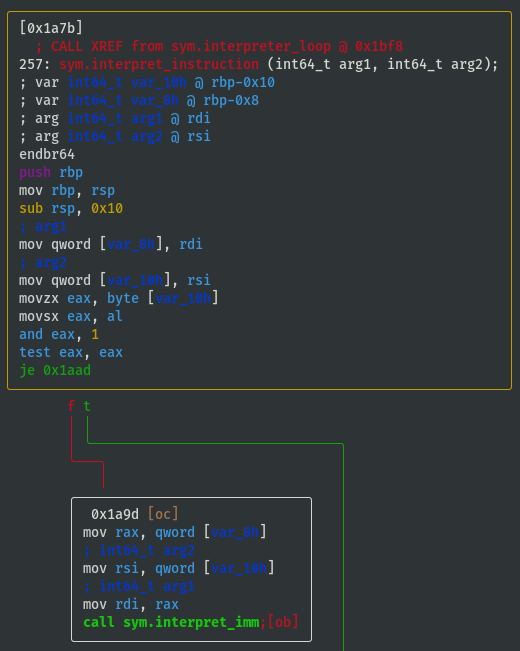
- If opcode==0x02 then call
sym.interpret_add:
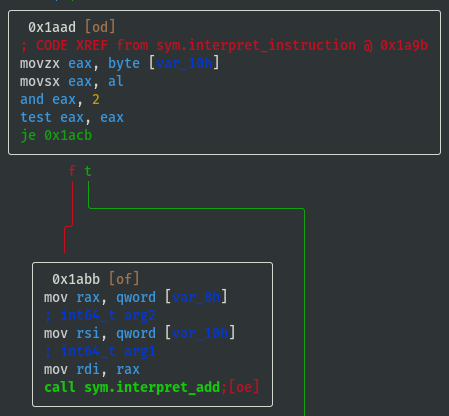
- If opcode==0x04 then call
sym.interpret_stk:
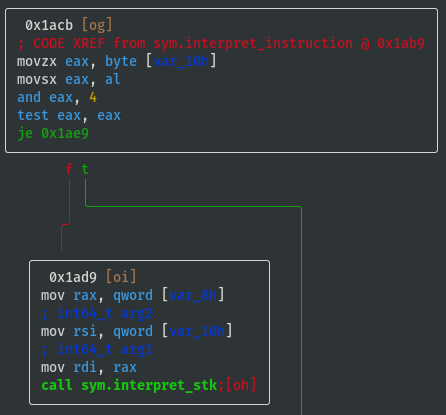
- If opcode==0x40 then call
sym.interpret_stm:
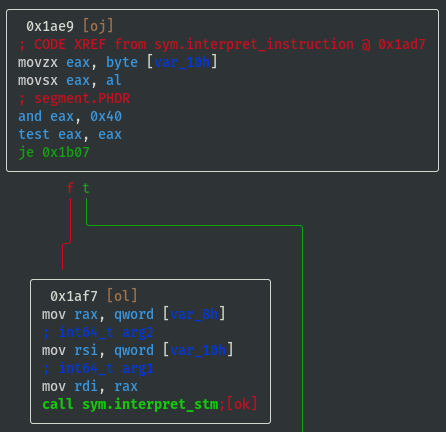
test al, al; jns 0x1b1f;means jump if signed bit (most significant bit) ofalregister is not set (i.e. if signed bit is set then callsym.interpret_ldmbecause it didn't jump), therefore opcode==0x80 is a possible way to callsym.interpret_ldm:
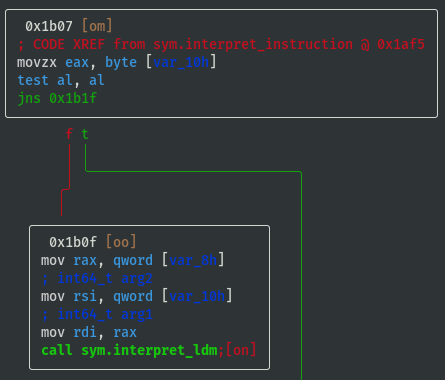
- If opcode==0x20 then call
sym.interpret_cmp:
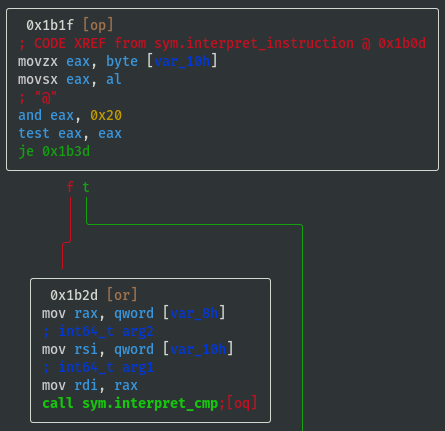
- If opcode==0x10 then call
sym.interpret_jmp:
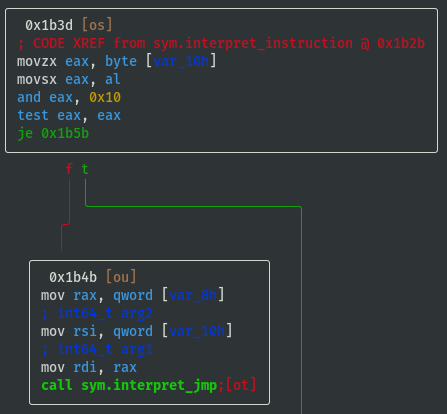
- If opcode==0x08 then call
sym.interpret_sys:
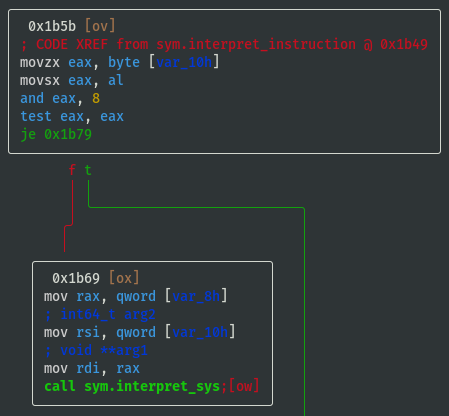
View write_register() Function
- Remember the
sys.write_registerfrom earlier? List functions and perform internal grep for write_register (focus on the branching, i.e. what switch case values are required to reach different registers?):
[0x00001180]>
afl~write_register
- View
sys.write_registerfunction to understand the registers:
[0x00001180]>
VV @ sym.write_register



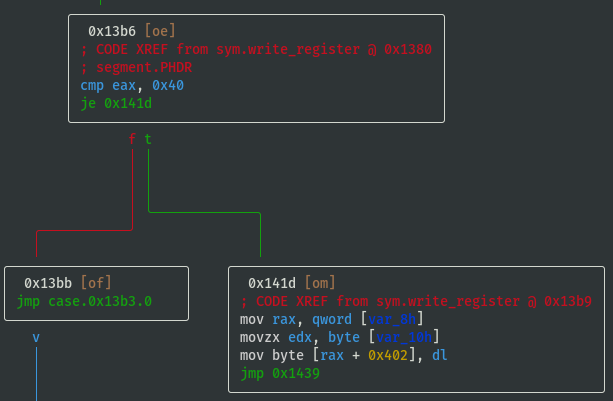
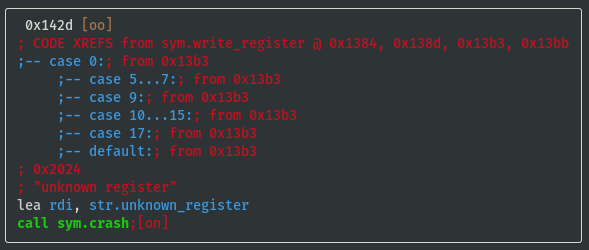
- Register values are stored in memory at offsets 0x3fc to 0x402
- Temporarily name registers by their offsets and note down the switch case lookup refs:
- reg_0x3fc: 0x20 (case 32)
- reg_0x3fd: 0x08 (case 08)
- reg_0x3fe: 0x10 (case 16)
- reg_0x3ff: 0x01 (case 01)
- reg_0x400: 0x02 (case 02)
- reg_0x401: 0x04 (case 04)
- reg_0x402: 0x40 (case 40)
View interpret_sys() Function
- View
sym.interpret_systo understand what syscalls can be executed by the emulator (focus on the branching, i.e. whattest/cmpconditions are required to either jump or not jump?):
[0x00001180]>
VV @ sym.interpret_sys
- If sys_value==0x20 then call open; int open(const char *path, int oflag):
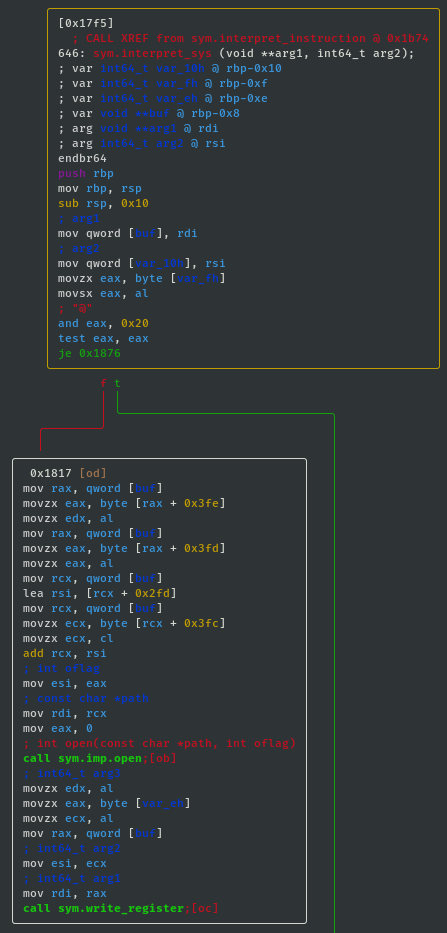
- Below are two code blocks that both make calls to the libc read function. It may not immediately be apparent what the difference between them is, but what is obvious is that they both attempt to read up to count
nbytebytes from file descriptorfildesinto the buffer starting atbuf. That is actually enough information to solve this challenge, but for later challenges it is worth understanding the difference. - If sys_value==0x01 then call read; ssize_t read(int fildes, void *buf, size_t nbyte):
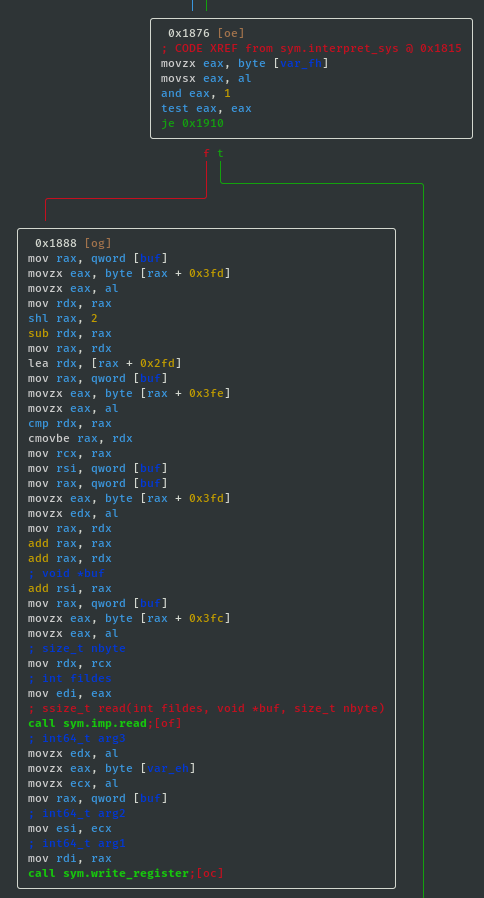
- If sys_value==0x08 then call read; ssize_t read(int fildes, void *buf, size_t nbyte):
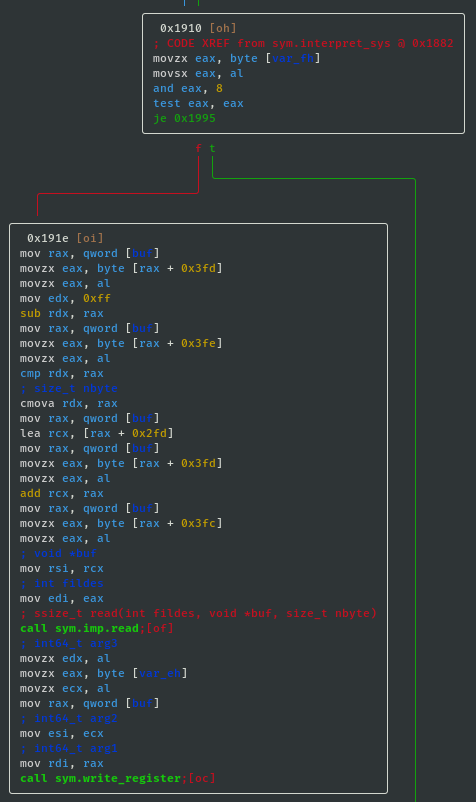
- If sys_value==0x04 then call write; ssize_t write(int fd, const char *ptr, size_t nbytes):
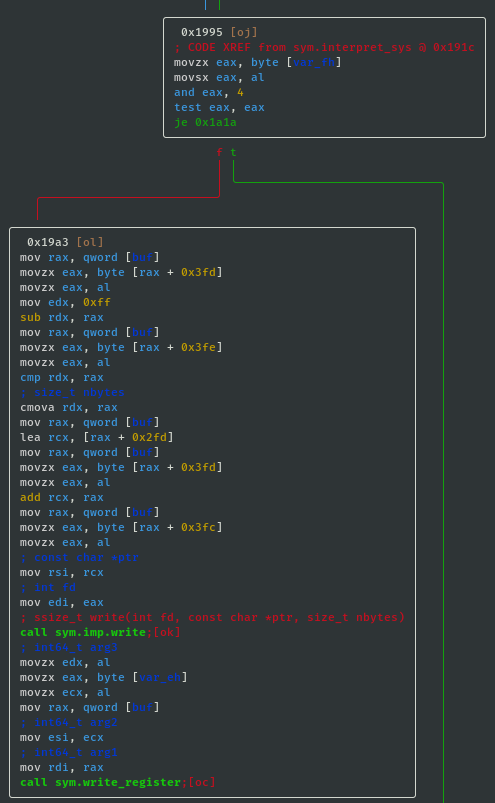
- If sys_value==0x10 then call sleep; int sleep(int s):
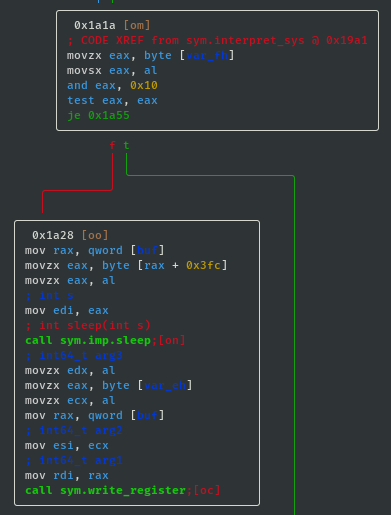
- If sys_value==0x02 then call exit; void exit(int status):
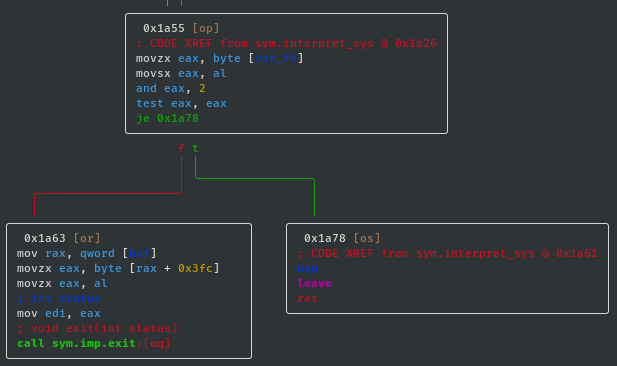
View interpret_cmp() Function
- View
sym.interpret_cmpto understand what values will be set in the emulated flag register (focus on the branching, i.e. whattest/cmpconditions are required to either jump or not jump?), and based on the condition we can assign some identifiable characters ('L', 'G', 'E', 'N', 'Z') for reference:
[0x00001180]>
VV @ sym.interpret_cmp
- If cmp_x < cmp_y (i.e. 'L'), then flag_value = flag_value | 0x10:
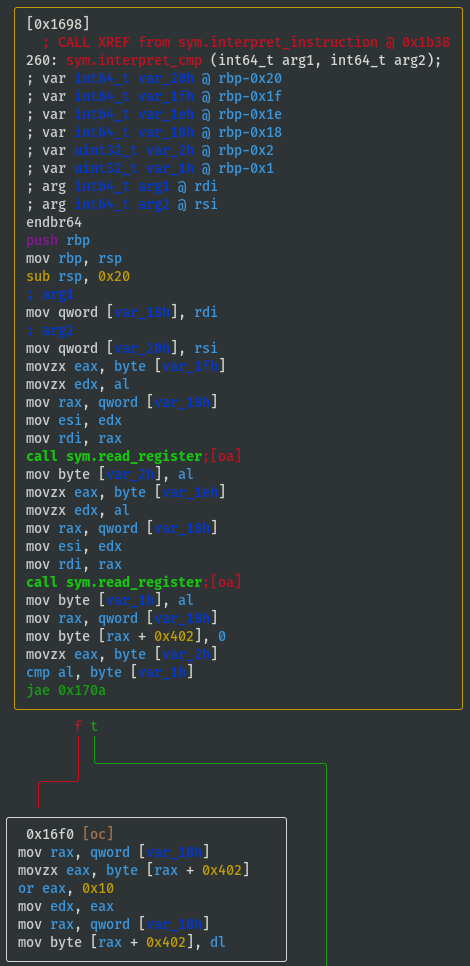
- If cmp_x > cmp_y (i.e. 'G'), then flag_value = flag_value | 0x01:
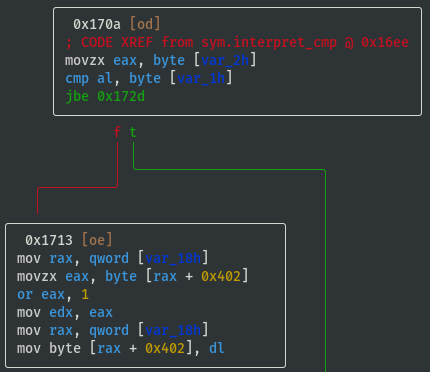
- If cmp_x == cmp_y (i.e. 'E'), then flag_value = flag_value | 0x02:
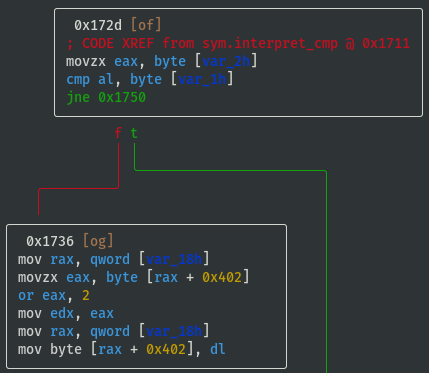
- If cmp_x != cmp_y (i.e. 'N'), then flag_value = flag_value | 0x04:
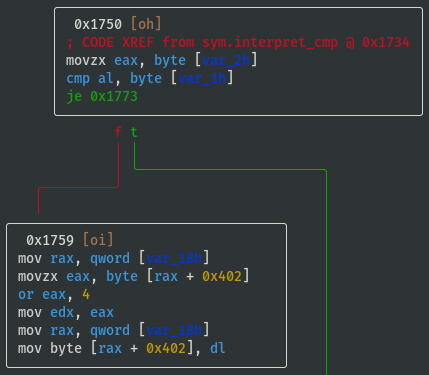
- If cmp_x == cmp_y == 0 (i.e. 'Z'), then flag_value = flag_value | 0x08:
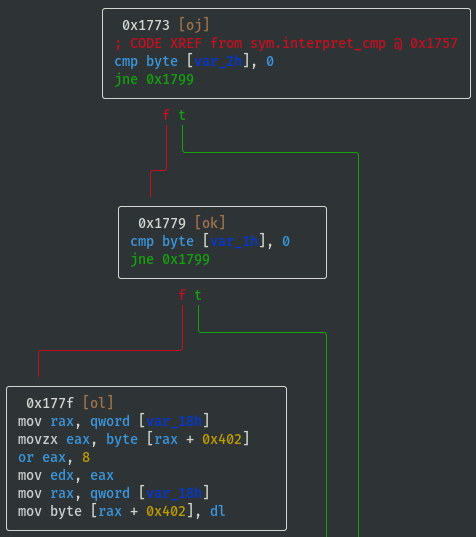
Summary of Part 1
- Each instruction is size 3 bytes (Note: the instruction order can change for different versions of the ELF binary)
- Register, opcode, syscall, compare lookup values are known (Note: the register, opcode, syscall and cmp mappings can change for different versions of the ELF binary):
# Pseudo Python code for notes purposes only
registers = {
reg_0x3fc: 0x20, # (case 32)
reg_0x3fd: 0x08, # (case 08)
reg_0x3fe: 0x10, # (case 16)
reg_0x3ff: 0x01, # (case 01)
reg_0x400: 0x02, # (case 02)
reg_0x401: 0x04, # (case 04)
reg_0x402: 0x40, # (case 40)
}
opcodes = {
'imm': 0x01,
'add': 0x02,
'stk': 0x04,
'stm': 0x40,
'ldm': 0x80,
'cmp': 0x20,
'jmp': 0x10,
'sys': 0x08,
}
syscalls = {
'open' : 0x20,
'read_code' : 0x01,
'read_memory' : 0x08,
'write' : 0x04,
'sleep' : 0x10,
'exit' : 0x02,
}
# CMP and JMP are closely linked, so assume that they interpreted in the same way
jump_description = ''
if flag_value & 0x10: jump_description += 'L'
if flag_value & 0x01: jump_description += 'G'
if flag_value & 0x02: jump_description += 'E'
if flag_value & 0x04: jump_description += 'N'
if flag_value & 0x08: jump_description += 'Z'
[Part 2] Dynamic Analysis Using GDB
$
gdb -q /level14_testing1
(gdb)disass interpret_instruction
Dump of assembler code for function interpret_instruction:
[...]
0x0000000000001aa8 <+45>: call 0x1491 <interpret_imm>
[...]
0x0000000000001ac6 <+75>: call 0x14c4 <interpret_add>
[...]
0x0000000000001ae4 <+105>: call 0x1527 <interpret_stk>
[...]
0x0000000000001b02 <+135>: call 0x15e6 <interpret_stm>
[...]
0x0000000000001b1a <+159>: call 0x1643 <interpret_ldm>
[...]
0x0000000000001b38 <+189>: call 0x1698 <interpret_cmp>
[...]
0x0000000000001b56 <+219>: call 0x179c <interpret_jmp>
[...]
0x0000000000001b74 <+249>: call 0x17f5 <interpret_sys>
[...]
- Print some helpful output at every breakpoint (
i r==info registers,x/8i $ripdisplays the next 8 instructions):
(gdb)
define hook-stop
Type commands for definition of "hook-stop".
End with a line saying just "end".
>i r
>x/8i $rip
>end
- Set breakpoint at all
interpret_*functions:
(gdb)
b interpret_imm
(gdb)b interpret_add
(gdb)b interpret_stk
(gdb)b interpret_stm
(gdb)b interpret_ldm
(gdb)b interpret_cmp
(gdb)b interpret_jmp
(gdb)b interpret_sys
- Run program:
(gdb)
r
- 1st cycle, interrupted at
interpret_imm,info registersshows:
rsi 0x470101 (which is 0x010147 when accounting for endianness)
- Continue:
(gdb)
c
- 2nd cycle, interrupted at
interpret_imm,info registersshows:
rsi 0x891001 (which is 0x011089 when accounting for endianness)
- These are the first 6 bytes of the
obj.vm_code(emulator's bytecode) looked at in radare2 earlier, recall the following in radare2:
V @ obj.vm_code
[0x00004020 [Xadvc]0 62% 896 /level14_testing1]> xc @ obj.vm_code
- offset - 0 1 2 3 4 5 6 7 8 9 A B C D E F 0123456789ABCDEF comment
0x00004020 0101 4701 1089 4010 0101 012e 0110 8f40 ..G...@........@ ; obj.vm_code
0x00004030 1001 0101 4c01 1082 4010 0101 01ab 0110 ....L...@.......
[...]
- Split instructions into groups of 3 bytes, then order appears to be [op, arg1, arg2]:
[0x01, 0x01, 0x47] -> imm reg_0x3ff, 0x47
[0x01, 0x10, 0x89] -> imm reg_0x3fe, 0x89
[0x40, 0x10, 0x01] -> guess... stm reg_0x3fe, reg_0x3ff maybe?
- Test
interpret_stmassumption by continuing and looking at which interpret_??? function we end up breaking at:
(gdb)
c
- 3rd cycle, interrupted at
interpret_stm,info registersappears to corroborate above assumption:
rsi 0x11040 (which is 0x401001 when accounting for endianness)
- Keep going through the vm_code to guess the next three instructions:
[0x01, 0x01, 0x2e] -> imm reg_0x3ff, 0x2e
[0x01, 0x10, 0x8f] -> imm reg_0x3fe, 0x8f
[0x40, 0x10, 0x01] -> guess... stm reg_0x3fe, reg_0x3ff again maybe?
- Continue again to test assumption:
(gdb)
c
- 4th cycle, interrupted at
interpret_imm,info registersshows:
rsi 0x2e0101 (which is 0x01012e when accounting for endianness)
- Continue:
(gdb)
c
- 5th cycle, interrupted at
interpret_imm,info registersshows:
rsi 0x8f1001 (which is 0x01108f when accounting for endianness)
- 6th cycle, interrupted at
interpret_stm,info registersshows:
rsi 0x11040 (which is 0x401001 when accounting for endianness)
- Therefore, instruction order when viewing
obj.vm_codeis [op, arg1, arg2] (Note: the instruction order can change for different versions of the ELF binary) - At this point (at beginning of 6th cycle, i.e. not yet executed current [0x40, 0x10, 0x01] instruction), based on the instructions executed thus far, the state of the emulator's registers is expected to be:
reg_0x3fc = 0x00
reg_0x3fd = 0x00
reg_0x3fe = 0x8f
reg_0x3ff = 0x2e
reg_0x400 = 0x00
reg_0x401 = 0x00
reg_0x402 = 0x00
- Assuming there is a register for the instruction pointer, one of the above register values is likely incorrect
- If instruction pointer register holds the value of the next instruction, then the value maybe could be 0x06?
- If instruction pointer register holds the value of the previous instruction, then the value maybe could be 0x05?
- Examine the stack to have a look for the emulator's stored state on the stack (Note: examine much more than the current function's stack frame, because we need to look for the state of the emulator's registers, which will be stored much earlier in the program's stack):
(gdb) x/150gx $rsp
[...]
0x7ffe124a57f8: 0x0000000000000000 0x0000000000000000
0x7ffe124a5808: 0x2e8f000000000000 0x00007ffe12000600 <-- These values look familiar
0x7ffe124a5818: 0xa957b0f74c9c8000 0x0000000000000000
0x7ffe124a5828: 0x00007fc32cc8e0b3 0x0000000000000031
0x7ffe124a5838: 0x00007ffe124a5918 0x000000012ce4f618
0x7ffe124a5848: 0x000056465be1dbff 0x000056465be1dd20
- Note that the memory addresses are likely to be different each time the program is run, so the relative addresses are the important parts to focus on
- Examine 7 bytes where it looks like the state of the registers is stored:
(gdb)
x/7bx 0x7ffe124a5808 + 0x04
0x7ffe124a580c: 0x00 0x00 0x8f 0x2e 0x00 0x06 0x00
??registers???: 0x3fc 0x3fd 0x3fe 0x3ff 0x400 0x401 0x402
- Revise assumption on state of the emulator's registers based on dumped stack values:
reg_0x3fc = 0x00
reg_0x3fd = 0x00
reg_0x3fe = 0x8f
reg_0x3ff = 0x2e
reg_0x400 = 0x00
reg_0x401 = 0x06 <-- Updated value (likely to be value of instruction pointer)
reg_0x402 = 0x00
- Calculate distance emulator's register state is stored on stack relative to stack pointer at current breakpoint:
(gdb)
p $rsp
$1 = (void *) 0x7ffe124a53a8
(gdb)p 0x7ffe124a580c - 0x7ffe124a53a8
$2 = 1124
- Check calculation is correct:
(gdb)
p/x $rsp + 1124$3 = 0x7ffe124a580c
- The 1124 (decimal) relative offset from stack pointer should be the same for each of the interpret_* breakpoints, if assumption is wrong it will become apparent in the next section when a GDB script is used to run program in batch mode and print useful info
Dynamic Analysis Using GDB Scripting
- Write a GDB script using the known mappings derived thus far, snippets of the GDB script will be described below:
$
vim /tmp/rev_level14_testing1.gdb
- Begin script with
startso that breakpoint is set at main and process is run:
start
- Set some variables that will used repeatedly
reg_offsis the offset from rsp that was determined in the previous section that locates the emulator's register state- In the previous section, the instructions were found to be in rsi at the relevant breakpoints, so
shift_op,shift_a1,shift_a2are the amounts to shift rsi by to isolate each byte of the instruction
set $reg_offs = 1124
set $shift_op = 0x00
set $shift_a1 = 0x08
set $shift_a2 = 0x10
- Register mappings were determined in the radare2 static analysis performed previously:
define describe_reg
if $arg0 == 0x20
printf "reg_0x3fc"
end
if $arg0 == 0x08
printf "reg_0x3fd"
end
if $arg0 == 0x10
printf "reg_0x3fe"
end
if $arg0 == 0x01
printf "reg_0x3ff"
end
if $arg0 == 0x02
printf "reg_0x400"
end
if $arg0 == 0x04
printf "reg_0x401"
end
if $arg0 == 0x40
printf "reg_0x402"
end
if $arg0 == 0x00
printf "NONE"
end
end
- Syscall mappings were determined in the radare2 static analysis performed previously:
define describe_sys
if $arg0 == 0x20
printf "open"
end
if $arg0 == 0x01
printf "read_code"
end
if $arg0 == 0x08
printf "read_memory"
end
if $arg0 == 0x04
printf "write"
end
if $arg0 == 0x10
printf "sleep"
end
if $arg0 == 0x02
printf "exit"
end
end
- Jump mappings were determined in the radare2 static analysis performed previously:
define describe_jmp
if $arg0 & 0x10
printf "L"
end
if $arg0 & 0x01
printf "G"
end
if $arg0 & 0x04
printf "N"
end
if $arg0 & 0x08
printf "Z"
end
if $arg0 & 0x02
printf "E"
end
end
- Define a function that prints the emulator's register state that can be called at each breakpoint:
define vm_state
set $reg_state = (long long) *(void**) ($rsp + $reg_offs)
printf "[V] reg_0x3fc:%#x reg_0x3fd:%#x reg_0x3fe:%#x reg_0x3ff:%#x reg_0x400:%#x reg_0x401:%#x reg_0x402:%#x\n", $reg_state >> 0x00 & 0xff, $reg_state >> 0x08 & 0xff, $reg_state >> 0x10 & 0xff, $reg_state >> 0x18 & 0xff, $reg_state >> 0x20 & 0xff, $reg_state >> 0x28 & 0xff, $reg_state >> 0x30 & 0xff
end
- Define a function that describes each instruction that can be called at each breakpoint:
define vm_instruction
printf "[I] op:%#x arg1:%#x arg2:%#x\n", $rsi>>$shift_op&0xff, $rsi>>$shift_a1&0xff, $rsi>>$shift_a2&0xff
end
- Break at all the
interpret_*function calls and print some useful info using a combo of previously defined helper functions andprintfspecific to each breakpoint:
break interpret_imm
commands
vm_state
vm_instruction
printf "[s] IMM "
describe_reg ($rsi>>$shift_a1&0xff)
printf " = %#x\n", $rsi>>$shift_a2&0xff
continue
end
break interpret_add
commands
vm_state
vm_instruction
printf "[s] ADD "
describe_reg ($rsi>>$shift_a1&0xff)
printf " "
describe_reg ($rsi>>$shift_a2&0xff)
printf " \n"
continue
end
break interpret_stk
commands
vm_state
vm_instruction
printf "[s] STK "
describe_reg ($rsi>>$shift_a1&0xff)
printf " "
describe_reg ($rsi>>$shift_a2&0xff)
printf " \n"
printf "[s] ... pushing "
describe_reg ($rsi>>$shift_a2&0xff)
printf "\n"
printf "[s] ... popping "
describe_reg ($rsi>>$shift_a1&0xff)
printf "\n"
continue
end
break interpret_stm
commands
vm_state
vm_instruction
printf "[s] STM *"
describe_reg ($rsi>>$shift_a1&0xff)
printf " = "
describe_reg ($rsi>>$shift_a2&0xff)
printf " \n"
continue
end
break interpret_ldm
commands
vm_state
vm_instruction
printf "[s] LDM "
describe_reg ($rsi>>$shift_a1&0xff)
printf " = *"
describe_reg ($rsi>>$shift_a2&0xff)
printf " \n"
continue
end
break interpret_cmp
commands
vm_state
vm_instruction
printf "[s] CMP "
describe_reg ($rsi>>$shift_a1&0xff)
printf " "
describe_reg ($rsi>>$shift_a2&0xff)
printf " \n"
continue
end
break interpret_jmp
commands
vm_state
vm_instruction
printf "[s] JMP "
describe_jmp ($rsi>>$shift_a1&0xff)
printf " "
describe_reg ($rsi>>$shift_a2&0xff)
printf " \n"
continue
end
break interpret_sys
commands
vm_state
vm_instruction
printf "[s] SYS %#x ", $rsi>>$shift_a1&0xff
describe_reg ($rsi>>$shift_a2&0xff)
printf " \n"
printf "[s] ... "
describe_sys ($rsi>>$shift_a1&0xff)
printf " \n"
continue
end
break crash
commands
vm_instruction
printf "[s] CRASH\n"
continue
end
- Finally, end with
continueso that GDB will be able to continue execution of program:
continue
- Run GDB in batch mode with the script just written:
$
gdb /level14_testing1 -batch -x /tmp/rev_level14_testing1.gdb
Breakpoint 9, 0x000056246321f7f5 in interpret_sys ()
[V] reg_0x3fc:0 reg_0x3fd:0x40 reg_0x3fe:0xe reg_0x3ff:0xb reg_0x400:0xe reg_0x401:0x46 reg_0x402:0
[I] op:0x8 arg1:0x8 arg2:0x1
[s] SYS 0x8 reg_0x3ff
[s] ... read_memory
- It stops and waits for input from STDIN, input
AAAAAAAAto see what happens:
[...]
Breakpoint 9, 0x000056246321f7f5 in interpret_sys ()
[V] reg_0x3fc:0x1 reg_0x3fd:0xc reg_0x3fe:0xb reg_0x3ff:0xa reg_0x400:0x16 reg_0x401:0x87 reg_0x402:0x5
[I] op:0x8 arg1:0x4 arg2:0x1
[s] SYS 0x4 reg_0x3ff
[s] ... write
INCORRECT!
Breakpoint 2, 0x000056246321f491 in interpret_imm ()
[V] reg_0x3fc:0x1 reg_0x3fd:0xc reg_0x3fe:0xb reg_0x3ff:0xb reg_0x400:0x16 reg_0x401:0x88 reg_0x402:0x5
[I] op:0x1 arg1:0x20 arg2:0x1
[s] IMM reg_0x3fc = 0x1
Breakpoint 9, 0x000056246321f7f5 in interpret_sys ()
[V] reg_0x3fc:0x1 reg_0x3fd:0xc reg_0x3fe:0xb reg_0x3ff:0xb reg_0x400:0x16 reg_0x401:0x89 reg_0x402:0x5
[I] op:0x8 arg1:0x2 arg2:0
[s] SYS 0x2 NONE
[s] ... exit
AAAAAAAAwas incorrect- Different input can be altered and piped in using a simple inline Python command:
$
python -c "import sys; sys.stdout.buffer.write(b'\x41'*20)" | gdb /level14_testing1 -batch -x /tmp/rev_level14_testing1.gdb
[...]
Breakpoint 9, 0x000056246321f7f5 in interpret_sys ()
[V] reg_0x3fc:0x1 reg_0x3fd:0xc reg_0x3fe:0xb reg_0x3ff:0xa reg_0x400:0x16 reg_0x401:0x87 reg_0x402:0x5
[I] op:0x8 arg1:0x4 arg2:0x1
[s] SYS 0x4 reg_0x3ff
[s] ... write
INCORRECT!
Breakpoint 2, 0x000056246321f491 in interpret_imm ()
[V] reg_0x3fc:0x1 reg_0x3fd:0xc reg_0x3fe:0xb reg_0x3ff:0xb reg_0x400:0x16 reg_0x401:0x88 reg_0x402:0x5
[I] op:0x1 arg1:0x20 arg2:0x1
[s] IMM reg_0x3fc = 0x1
Breakpoint 9, 0x000056246321f7f5 in interpret_sys ()
[V] reg_0x3fc:0x1 reg_0x3fd:0xc reg_0x3fe:0xb reg_0x3ff:0xb reg_0x400:0x16 reg_0x401:0x89 reg_0x402:0x5
[I] op:0x8 arg1:0x2 arg2:0
[s] SYS 0x2 NONE
[s] ... exit
- But the above input was still incorrect
Identifying the Instruction Pointer Register
- Analyse the output in more detail by
grepping for the somewhere near the start and selecting the 50 lines after it:
$
python -c "import sys; sys.stdout.buffer.write(b'\x41'*20)" | gdb /level14_testing1 -batch -x /tmp/rev_level14_testing1.gdb | grep -A50 "\[+\] Starting interpreter loop! Good luck!"
[+] Starting interpreter loop! Good luck!
Breakpoint 2, 0x000055f95929e491 in interpret_imm ()
[V] reg_0x3fc:0 reg_0x3fd:0 reg_0x3fe:0 reg_0x3ff:0 reg_0x400:0 reg_0x401:0x1 reg_0x402:0
[I] op:0x1 arg1:0x1 arg2:0x47
[s] IMM reg_0x3ff = 0x47
Breakpoint 2, 0x000055f95929e491 in interpret_imm ()
[V] reg_0x3fc:0 reg_0x3fd:0 reg_0x3fe:0 reg_0x3ff:0x47 reg_0x400:0 reg_0x401:0x2 reg_0x402:0
[I] op:0x1 arg1:0x10 arg2:0x89
[s] IMM reg_0x3fe = 0x89
Breakpoint 5, 0x000055f95929e5e6 in interpret_stm ()
[V] reg_0x3fc:0 reg_0x3fd:0 reg_0x3fe:0x89 reg_0x3ff:0x47 reg_0x400:0 reg_0x401:0x3 reg_0x402:0
[I] op:0x40 arg1:0x10 arg2:0x1
[s] STM *reg_0x3fe = reg_0x3ff
Breakpoint 2, 0x000055f95929e491 in interpret_imm ()
[V] reg_0x3fc:0 reg_0x3fd:0 reg_0x3fe:0x89 reg_0x3ff:0x47 reg_0x400:0 reg_0x401:0x4 reg_0x402:0
[I] op:0x1 arg1:0x1 arg2:0x2e
[s] IMM reg_0x3ff = 0x2e
Breakpoint 2, 0x000055f95929e491 in interpret_imm ()
[V] reg_0x3fc:0 reg_0x3fd:0 reg_0x3fe:0x89 reg_0x3ff:0x2e reg_0x400:0 reg_0x401:0x5 reg_0x402:0
[I] op:0x1 arg1:0x10 arg2:0x8f
[s] IMM reg_0x3fe = 0x8f
Breakpoint 5, 0x000055f95929e5e6 in interpret_stm ()
[V] reg_0x3fc:0 reg_0x3fd:0 reg_0x3fe:0x8f reg_0x3ff:0x2e reg_0x400:0 reg_0x401:0x6 reg_0x402:0
[I] op:0x40 arg1:0x10 arg2:0x1
[s] STM *reg_0x3fe = reg_0x3ff
Breakpoint 2, 0x000055f95929e491 in interpret_imm ()
[V] reg_0x3fc:0 reg_0x3fd:0 reg_0x3fe:0x8f reg_0x3ff:0x2e reg_0x400:0 reg_0x401:0x7 reg_0x402:0
[I] op:0x1 arg1:0x1 arg2:0x4c
[s] IMM reg_0x3ff = 0x4c
Breakpoint 2, 0x000055f95929e491 in interpret_imm ()
[V] reg_0x3fc:0 reg_0x3fd:0 reg_0x3fe:0x8f reg_0x3ff:0x4c reg_0x400:0 reg_0x401:0x8 reg_0x402:0
[I] op:0x1 arg1:0x10 arg2:0x82
[s] IMM reg_0x3fe = 0x82
Breakpoint 5, 0x000055f95929e5e6 in interpret_stm ()
[V] reg_0x3fc:0 reg_0x3fd:0 reg_0x3fe:0x82 reg_0x3ff:0x4c reg_0x400:0 reg_0x401:0x9 reg_0x402:0
[I] op:0x40 arg1:0x10 arg2:0x1
[s] STM *reg_0x3fe = reg_0x3ff
Breakpoint 2, 0x000055f95929e491 in interpret_imm ()
[V] reg_0x3fc:0 reg_0x3fd:0 reg_0x3fe:0x82 reg_0x3ff:0x4c reg_0x400:0 reg_0x401:0xa reg_0x402:0
[I] op:0x1 arg1:0x1 arg2:0xab
[s] IMM reg_0x3ff = 0xab
reg_0x401is incrementing by 1 at each new instruction, so this again confirms the assumption that this register is keeping track of the instruction pointer
Identifying the Stack Pointer Register
- Now grep for some specific instructions (starting with
STK) and print some lines above and below:
$
python -c "import sys; sys.stdout.buffer.write(b'\x41'*20)" | gdb /level14_testing1 -batch -x /tmp/rev_level14_testing1.gdb | grep -B3 -A5 "STK" | grep -v "... popping NONE" | grep -v "... pushing NONE"
- Using
-vtag, exclude lines that print "... popping NONE" and "... pushing NONE", as these are a result of the GDB script not being refined enough to work out when an in instruction is a push only or a pop only instruction
Breakpoint 4, 0x0000562462367527 in interpret_stk ()
[V] reg_0x3fc:0 reg_0x3fd:0 reg_0x3fe:0x8c reg_0x3ff:0xc2 reg_0x400:0 reg_0x401:0x1f reg_0x402:0
[I] op:0x4 arg1:0 arg2:0x20
[s] STK NONE reg_0x3fc
[s] ... pushing reg_0x3fc
Breakpoint 4, 0x0000562462367527 in interpret_stk ()
[V] reg_0x3fc:0 reg_0x3fd:0 reg_0x3fe:0x8c reg_0x3ff:0xc2 reg_0x400:0x1 reg_0x401:0x20 reg_0x402:0
[I] op:0x4 arg1:0 arg2:0x8
[s] STK NONE reg_0x3fd
[s] ... pushing reg_0x3fd
Breakpoint 4, 0x0000562462367527 in interpret_stk ()
[V] reg_0x3fc:0 reg_0x3fd:0 reg_0x3fe:0x8c reg_0x3ff:0xc2 reg_0x400:0x2 reg_0x401:0x21 reg_0x402:0
[I] op:0x4 arg1:0 arg2:0x10
[s] STK NONE reg_0x3fe
[s] ... pushing reg_0x3fe
Breakpoint 2, 0x0000562462367491 in interpret_imm ()
[V] reg_0x3fc:0 reg_0x3fd:0 reg_0x3fe:0x8c reg_0x3ff:0xc2 reg_0x400:0x3 reg_0x401:0x22 reg_0x402:0
--
Breakpoint 4, 0x0000562462367527 in interpret_stk ()
[V] reg_0x3fc:0 reg_0x3fd:0x4 reg_0x3fe:0x8c reg_0x3ff:0x45 reg_0x400:0x3 reg_0x401:0x25 reg_0x402:0
[I] op:0x4 arg1:0 arg2:0x1
[s] STK NONE reg_0x3ff
[s] ... pushing reg_0x3ff
Breakpoint 2, 0x0000562462367491 in interpret_imm ()
[V] reg_0x3fc:0 reg_0x3fd:0x4 reg_0x3fe:0x8c reg_0x3ff:0x45 reg_0x400:0x4 reg_0x401:0x26 reg_0x402:0
[...]
- From the above output, it can be seen that the line showing the register state after each push instruction, the value of
reg_0x400increases - If we keep looking through the output, there are some pop instructions:
[...]
Breakpoint 4, 0x0000562462367527 in interpret_stk ()
[V] reg_0x3fc:0 reg_0x3fd:0x40 reg_0x3fe:0xe reg_0x3ff:0xe reg_0x400:0xe reg_0x401:0x47 reg_0x402:0
[I] op:0x4 arg1:0x10 arg2:0
[s] STK reg_0x3fe NONE
[s] ... popping reg_0x3fe
Breakpoint 4, 0x0000562462367527 in interpret_stk ()
[V] reg_0x3fc:0 reg_0x3fd:0x40 reg_0x3fe:0x20 reg_0x3ff:0xe reg_0x400:0xd reg_0x401:0x48 reg_0x402:0
[I] op:0x4 arg1:0x8 arg2:0
[s] STK reg_0x3fd NONE
[s] ... popping reg_0x3fd
Breakpoint 4, 0x0000562462367527 in interpret_stk ()
[V] reg_0x3fc:0 reg_0x3fd:0x3a reg_0x3fe:0x20 reg_0x3ff:0xe reg_0x400:0xc reg_0x401:0x49 reg_0x402:0
[I] op:0x4 arg1:0x20 arg2:0
[s] STK reg_0x3fc NONE
[s] ... popping reg_0x3fc
Breakpoint 2, 0x0000562462367491 in interpret_imm ()
[V] reg_0x3fc:0x59 reg_0x3fd:0x3a reg_0x3fe:0x20 reg_0x3ff:0xe reg_0x400:0xb reg_0x401:0x4a reg_0x402:0
[...]
- From the above output, it can be seen that the line showing the register state after each pop instruction, the value of
reg_0x400decreases - Therefore
reg_0x400should be the stack pointer - Some instructions are a push and a pop in the same instruction, e.g.:
[...]
Breakpoint 4, 0x0000556ee88bd527 in interpret_stk ()
[V] reg_0x3fc:0x4b reg_0x3fd:0x8f reg_0x3fe:0xc reg_0x3ff:0x6a reg_0x400:0xc reg_0x401:0x6b reg_0x402:0x5
[I] op:0x4 arg1:0x1 arg2:0x10
[s] STK reg_0x3ff reg_0x3fe
[s] ... pushing reg_0x3fe
[s] ... popping reg_0x3ff
Breakpoint 4, 0x0000556ee88bd527 in interpret_stk ()
[V] reg_0x3fc:0x4b reg_0x3fd:0x8f reg_0x3fe:0xc reg_0x3ff:0xc reg_0x400:0xc reg_0x401:0x6c reg_0x402:0x5
[...]
- The line showing the register state after each push-pop instruction, the value of
reg_0x400stays the same - The above output shows that the value in
reg_0x3feis first pushed on to the stack and immediately popped intoreg_0x3ff
Identifying the Flag Register
- Now send forty b'\x41' bytes, grep for
CMPinstruction and print some lines above and below:
$
python -c "import sys; sys.stdout.buffer.write(b'\x41'*40)" | gdb /level14_testing1 -batch -x /tmp/rev_level14_testing1.gdb | grep -B3 -A3 "CMP"
Breakpoint 7, 0x00005628cc387698 in interpret_cmp ()
[V] reg_0x3fc:0x41 reg_0x3fd:0x2e reg_0x3fe:0xc reg_0x3ff:0xff reg_0x400:0xe reg_0x401:0x60 reg_0x402:0
[I] op:0x20 arg1:0x20 arg2:0x8
[s] CMP reg_0x3fc reg_0x3fd
Breakpoint 4, 0x00005628cc387527 in interpret_stk ()
[V] reg_0x3fc:0x41 reg_0x3fd:0x2e reg_0x3fe:0xc reg_0x3ff:0xff reg_0x400:0xe reg_0x401:0x61 reg_0x402:0x5
[...]
- So the first time the breakpoint hits the
interpret_cmpinstruction it's comparingreg_0x3fc:0x41vsreg_0x3fd:0x2e reg_0x3fcvalue is 0x41, which looks like it could be one of our inputted values- From the previous static analysis using radare2, the
interpret_cmpinstruction set flags in the following manner:
# Pseudo Python code for notes purposes only
flag_value = ''
if cmp_x < cmp_y: flag_value += flag_value | 0x10 # i.e. 'L'
if cmp_x > cmp_y: flag_value += flag_value | 0x01 # i.e. 'G'
if cmp_x == cmp_y: flag_value += flag_value | 0x02 # i.e. 'E'
if cmp_x != cmp_y: flag_value += flag_value | 0x04 # i.e. 'N'
if cmp_x == cmp_y == 0: flag_value += flag_value | 0x08 # i.e. 'Z'
- 0x41 > 0x2e and they are not equal, so we expect flag_value to be
or'd with both 0x01 and 0x04, which equates to 0x05 - The line showing the register state after the cmp instruction, the value of
reg_0x402changes to 0x05 - Try again with different input (this time, forty null bytes):
$
python -c "import sys; sys.stdout.buffer.write(b'\x00'*40)" | gdb /level14_testing1 -batch -x /tmp/rev_level14_testing1.gdb | grep -B3 -A3 "CMP"
Breakpoint 7, 0x000056067b2c8698 in interpret_cmp ()
[V] reg_0x3fc:0 reg_0x3fd:0x2e reg_0x3fe:0xc reg_0x3ff:0xff reg_0x400:0xe reg_0x401:0x60 reg_0x402:0
[I] op:0x20 arg1:0x20 arg2:0x8
[s] CMP reg_0x3fc reg_0x3fd
Breakpoint 4, 0x000056067b2c8527 in interpret_stk ()
[V] reg_0x3fc:0 reg_0x3fd:0x2e reg_0x3fe:0xc reg_0x3ff:0xff reg_0x400:0xe reg_0x401:0x61 reg_0x402:0x14
[...]
- For the null bytes input, the first time it hits the
interpret_cmpbreakpoint, it's comparingreg_0x3fc:0x00vsreg_0x3fd:0x2e - Again,
reg_0x3fcvalue (0x00) looks like it's one of our inputted values - 0x00 < 0x2e and they are not equal, so we expect flag_value to be
or'd with both 0x10 and 0x04, which equates 0x14 - The line showing the register state after the cmp instruction, the value of
reg_0x402changes to 0x14, so the assumptions on theinterpret_cmpinstruction appear correct so far - This time, try a non-repeating pattern as input to see which index of our input is used in the comparison:
$
python -c "import sys; sys.stdout.buffer.write(b'\xe1\xe2\xe3\xe4\xe5\xe6\xe7\xe8\xe9\xea\xeb\xec\xed\xee\xef\xf0\xf1\xf2\xf3\xf4\xf5\xf6\xf7\xf8\xf9\xfa\xfb\xfc\xfd\xfe\xff')" | gdb /level14_testing1 -batch -x /tmp/rev_level14_testing1.gdb | grep -B3 -A3 "CMP"
Breakpoint 7, 0x000055b0ca655698 in interpret_cmp ()
[V] reg_0x3fc:0xec reg_0x3fd:0x2e reg_0x3fe:0xc reg_0x3ff:0xff reg_0x400:0xe reg_0x401:0x60 reg_0x402:0
[I] op:0x20 arg1:0x20 arg2:0x8
[s] CMP reg_0x3fc reg_0x3fd
Breakpoint 4, 0x000055b0ca655527 in interpret_stk ()
[V] reg_0x3fc:0xec reg_0x3fd:0x2e reg_0x3fe:0xc reg_0x3ff:0xff reg_0x400:0xe reg_0x401:0x61 reg_0x402:0x5
[...]
- From above output, the comparison is now between
reg_0x3fc:0xecvsreg_0x3fd:0x2e, so let's summarise, update assumptions and refine the GDB script in the step below
Summary of Part 2
reg_0x3fc,reg_0x3fd,reg_0x3fe,reg_0x3ffseem to be general purpose registersreg_0x400is the stack pointer registerreg_0x401is the instruction pointer registerreg_0x402is the flag register that uses bitmasks to set relevant flags- Sending input of
b'\xe1\xe2\xe3\xe4\xe5\xe6\xe7\xe8\xe9\xea\xeb\xec\xed\xee\xef\xf0\xf1\xf2\xf3\xf4\xf5\xf6\xf7\xf8\xf9\xfa\xfb\xfc\xfd\xfe\xff'led to first comparison being made by emulator between 0xec and 0x2e - Each instruction is size 3 bytes (Note: the instruction order can change for different versions of the ELF binary)
- Register, opcode, syscall, compare lookup values are known (Note: the register, opcode, syscall and cmp mappings can change for different versions of the ELF binary)
- Rename registers based on new info:
# Pseudo Python code for notes purposes only
registers = {
a: 0x20, # (case 32)
b: 0x08, # (case 08)
c: 0x10, # (case 16)
d: 0x01, # (case 01)
s: 0x02, # (case 02)
i: 0x04, # (case 04)
f: 0x40, # (case 40)
}
opcodes = {
'imm': 0x01,
'add': 0x02,
'stk': 0x04,
'stm': 0x40,
'ldm': 0x80,
'cmp': 0x20,
'jmp': 0x10,
'sys': 0x08,
}
syscalls = {
'open' : 0x20,
'read_code' : 0x01,
'read_memory' : 0x08,
'write' : 0x04,
'sleep' : 0x10,
'exit' : 0x02,
}
jump_description = ''
if flag_value & 0x10: jump_description += 'L'
if flag_value & 0x01: jump_description += 'G'
if flag_value & 0x02: jump_description += 'E'
if flag_value & 0x04: jump_description += 'N'
if flag_value & 0x08: jump_description += 'Z'
- Update GDB script with new register names:
[...]
define describe_reg
if $arg0 == 0x20
printf "a"
end
if $arg0 == 0x08
printf "b"
end
if $arg0 == 0x10
printf "c"
end
if $arg0 == 0x01
printf "d"
end
if $arg0 == 0x02
printf "s"
end
if $arg0 == 0x04
printf "i"
end
if $arg0 == 0x40
printf "f"
end
if $arg0 == 0x00
printf "NONE"
end
end
[...]
define vm_state
set $reg_state = (long long) *(void**) ($rsp + $reg_offs)
printf "[V] a:%#x b:%#x c:%#x d:%#x s:%#x i:%#x f:%#x\n", $reg_state >> 0x00 & 0xff, $reg_state >> 0x08 & 0xff, $reg_state >> 0x10 & 0xff, $reg_state >> 0x18 & 0xff, $reg_state >> 0x20 & 0xff, $reg_state >> 0x28 & 0xff, $reg_state >> 0x30 & 0xff
end
[...]
[Part 3] Crafting the Solution
- With revised GDB script, try a non-repeating pattern as input, but change the 0xec to 0x2e:
$
python -c "import sys; sys.stdout.buffer.write(b'\xe1\xe2\xe3\xe4\xe5\xe6\xe7\xe8\xe9\xea\xeb\x2e\xed\xee\xef\xf0\xf1\xf2\xf3\xf4\xf5\xf6\xf7\xf8\xf9\xfa\xfb\xfc\xfd\xfe\xff')" | gdb /level14_testing1 -batch -x /tmp/rev_level14_testing1.gdb | grep -B3 -A3 "CMP"
- This time the output is different, there are more comparisons:
Breakpoint 7, 0x0000563eab40e698 in interpret_cmp ()
[V] a:0x2e b:0x2e c:0xc d:0xff s:0xe i:0x60 f:0
[I] op:0x20 arg1:0x20 arg2:0x8
[s] CMP a b
Breakpoint 4, 0x0000563eab40e527 in interpret_stk ()
[V] a:0x2e b:0x2e c:0xc d:0xff s:0xe i:0x61 f:0x2
--
Breakpoint 7, 0x0000563eab40e698 in interpret_cmp ()
[V] a:0x4b b:0x8f c:0xb d:0 s:0xc i:0x68 f:0x2
[I] op:0x20 arg1:0x10 arg2:0x1
[s] CMP c d
Breakpoint 2, 0x0000563eab40e491 in interpret_imm ()
[V] a:0x4b b:0x8f c:0xb d:0 s:0xc i:0x69 f:0x5
--
Breakpoint 7, 0x0000563eab40e698 in interpret_cmp ()
[V] a:0xeb b:0x90 c:0xb d:0xff s:0xe i:0x60 f:0x5
[I] op:0x20 arg1:0x20 arg2:0x8
[s] CMP a b
Breakpoint 4, 0x0000563eab40e527 in interpret_stk ()
[V] a:0xeb b:0x90 c:0xb d:0xff s:0xe i:0x61 f:0x5
[...]
- Now try changing the 0xeb to 0x90 and only grep for "CMP a b" as this looks like the important comparison:
$
python -c "import sys; sys.stdout.buffer.write(b'\xe1\xe2\xe3\xe4\xe5\xe6\xe7\xe8\xe9\xea\x90\x2e\xed\xee\xef\xf0\xf1\xf2\xf3\xf4\xf5\xf6\xf7\xf8\xf9\xfa\xfb\xfc\xfd\xfe\xff')" | gdb /level14_testing1 -batch -x /tmp/rev_level14_testing1.gdb | grep -B3 -A3 "CMP a b"
- Again the output is different as there's also a comparison between 0xea and 0x3b, looks like we're making progress:
Breakpoint 7, 0x0000562fa1832698 in interpret_cmp ()
[V] a:0x2e b:0x2e c:0xc d:0xff s:0xe i:0x60 f:0
[I] op:0x20 arg1:0x20 arg2:0x8
[s] CMP a b
Breakpoint 4, 0x0000562fa1832527 in interpret_stk ()
[V] a:0x2e b:0x2e c:0xc d:0xff s:0xe i:0x61 f:0x2
--
Breakpoint 7, 0x0000562fa1832698 in interpret_cmp ()
[V] a:0x90 b:0x90 c:0xb d:0xff s:0xe i:0x60 f:0x5
[I] op:0x20 arg1:0x20 arg2:0x8
[s] CMP a b
Breakpoint 4, 0x0000562fa1832527 in interpret_stk ()
[V] a:0x90 b:0x90 c:0xb d:0xff s:0xe i:0x61 f:0x2
--
Breakpoint 7, 0x0000562fa1832698 in interpret_cmp ()
[V] a:0xea b:0x3b c:0xa d:0xff s:0xe i:0x60 f:0x5
[I] op:0x20 arg1:0x20 arg2:0x8
[s] CMP a b
Breakpoint 4, 0x0000562fa1832527 in interpret_stk ()
[V] a:0xea b:0x3b c:0xa d:0xff s:0xe i:0x61 f:0x5
- As it seems like our input from 0xed onward is being discarded, let's continue on this basis and also keep updating the compared value to what it seems like the program wants (also don't bother
grepping for the lines after the specifed criteria):
$
python -c "import sys; sys.stdout.buffer.write(b'\xe1\xe2\xe3\xe4\xe5\xe6\xe7\xe8\xe9\x3b\x90\x2e')" | gdb /level14_testing1 -batch -x /tmp/rev_level14_testing1.gdb | grep -B3 "CMP a b"
Breakpoint 7, 0x000055d923803698 in interpret_cmp ()
[V] a:0x2e b:0x2e c:0xc d:0xff s:0xe i:0x60 f:0
[I] op:0x20 arg1:0x20 arg2:0x8
[s] CMP a b
--
Breakpoint 7, 0x000055d923803698 in interpret_cmp ()
[V] a:0x90 b:0x90 c:0xb d:0xff s:0xe i:0x60 f:0x5
[I] op:0x20 arg1:0x20 arg2:0x8
[s] CMP a b
--
Breakpoint 7, 0x000055d923803698 in interpret_cmp ()
[V] a:0x3b b:0x3b c:0xa d:0xff s:0xe i:0x60 f:0x5
[I] op:0x20 arg1:0x20 arg2:0x8
[s] CMP a b
--
Breakpoint 7, 0x000055d923803698 in interpret_cmp ()
[V] a:0xe9 b:0xc2 c:0x9 d:0xff s:0xe i:0x60 f:0x5
[I] op:0x20 arg1:0x20 arg2:0x8
[s] CMP a b
- Keep going, change 0xe9 to 0xc2
$
python -c "import sys; sys.stdout.buffer.write(b'\xe1\xe2\xe3\xe4\xe5\xe6\xe7\xe8\xc2\x3b\x90\x2e')" | gdb /level14_testing1 -batch -x /tmp/rev_level14_testing1.gdb | grep -B3 "CMP a b"
Breakpoint 7, 0x000055c98537f698 in interpret_cmp ()
[V] a:0x2e b:0x2e c:0xc d:0xff s:0xe i:0x60 f:0
[I] op:0x20 arg1:0x20 arg2:0x8
[s] CMP a b
--
Breakpoint 7, 0x000055c98537f698 in interpret_cmp ()
[V] a:0x90 b:0x90 c:0xb d:0xff s:0xe i:0x60 f:0x5
[I] op:0x20 arg1:0x20 arg2:0x8
[s] CMP a b
--
Breakpoint 7, 0x000055c98537f698 in interpret_cmp ()
[V] a:0x3b b:0x3b c:0xa d:0xff s:0xe i:0x60 f:0x5
[I] op:0x20 arg1:0x20 arg2:0x8
[s] CMP a b
--
Breakpoint 7, 0x000055c98537f698 in interpret_cmp ()
[V] a:0xc2 b:0xc2 c:0x9 d:0xff s:0xe i:0x60 f:0x5
[I] op:0x20 arg1:0x20 arg2:0x8
[s] CMP a b
--
Breakpoint 7, 0x000055c98537f698 in interpret_cmp ()
[V] a:0xe8 b:0xa8 c:0x8 d:0xff s:0xe i:0x60 f:0x5
[I] op:0x20 arg1:0x20 arg2:0x8
[s] CMP a b
- Assuming that the comparisons keep being made until the start of the input, we can either carry on in this manner, or write a script to finish the rest
- Although there aren't many comparisons left to be made, doing this manually doesn't sound interesting, so let's write a Python script to get us the flag
Get Flag Script Using Python
vim /tmp/rev_level14_testing1.py
import os
import re
import subprocess
elf_binary = '/level14_testing1'
gdb_script = '/tmp/rev_level14_testing1.gdb'
def bytes_str(bytes_obj: bytes) -> str:
# Takes bytes type object as argument and returns string in hex '\x' format
return ''.join(f'\\x{byte:02x}' for byte in bytes_obj)
def get_key() -> bytes:
key = b''.join(byte.to_bytes(1, 'big') for byte in range(0xe0, 0x100))
print('[*] Obtaining key via GDB script:')
# Loop through key attempt in reverse order as ELF binary does CMP in this order
for i in range(len(key)-1, -1, -1):
sp = subprocess.run(
['gdb', elf_binary, '-batch', '-x', gdb_script],
input = key,
stdout = subprocess.PIPE,
stderr = subprocess.PIPE,
)
out = sp.stdout.decode('latin1')
# Extract a and b from output
cmp_ab = re.findall('\[V\] a:0x(.*) b:0x(.*) c:.* d:.* s:.* f:.*\n.*\n\[s\] CMP a b', out)[::-1]
a = int(cmp_ab[i][0], 16) if len(cmp_ab)==len(key) else int(cmp_ab[0][0], 16)
b = int(cmp_ab[i][1], 16) if len(cmp_ab)==len(key) else int(cmp_ab[0][1], 16)
print(f"index={i:02d} a={hex(a)} b={hex(b)} test_key=b'{bytes_str(key)}'")
# Update key by overwriting immutable bytes object with b at index i if our input a is found
key = key[:i] + b.to_bytes(1, 'big') + key[i+1:] if key[i]==a else key[:i]
print(f'Key: {bytes_str(key)}', end='\n\n')
return key
def get_flag(key: bytes) -> str:
print('[*] Obtaining flag from setuid binary:')
sp = subprocess.run(
[elf_binary],
input = key,
stdout = subprocess.PIPE,
stderr = subprocess.PIPE,
)
out = sp.stdout.decode('latin1')
flag = re.findall('_college{(.*)}', out)
return f'pwn_college{{{flag[0]}}}' if len(flag) else ''
def main():
assert os.path.isfile(elf_binary), f'Could not find file {elf_binary}'
assert os.path.isfile(gdb_script), f'Could not find file {gdb_script}'
key = get_key()
flag = get_flag(key)
print(flag) if flag else print('Error obtaining flag')
exit(42)
if __name__=='__main__':
main()
- Run the script:
$
python /tmp/rev_level14_testing1.py
[...]
Key: \xd2\xab\x34\x27\x97\x47\x57\xa8\xc2\x3b\x90\x2e
[*] Obtaining flag from setuid binary:
pwn_college{flag}
- And there's the flag
- We can also
echothe key and pipe it to the ELF binary to confirm:
$
echo -ne "\xd2\xab\x34\x27\x97\x47\x57\xa8\xc2\x3b\x90\x2e" | /level14_testing1
[+] Welcome to /level14_testing1!
[+] This challenge is an custom emulator. It emulates a completely custom
[+] architecture that we call "Yan85"! You'll have to understand the
[+] emulator to understand the architecture, and you'll have to understand
[+] the architecture to understand the code being emulated, and you will
[+] have to understand that code to get the flag. Good luck!
[+] Starting interpreter loop! Good luck!
ENTER KEY: CORRECT! Here is your flag:
pwn_college{flag}